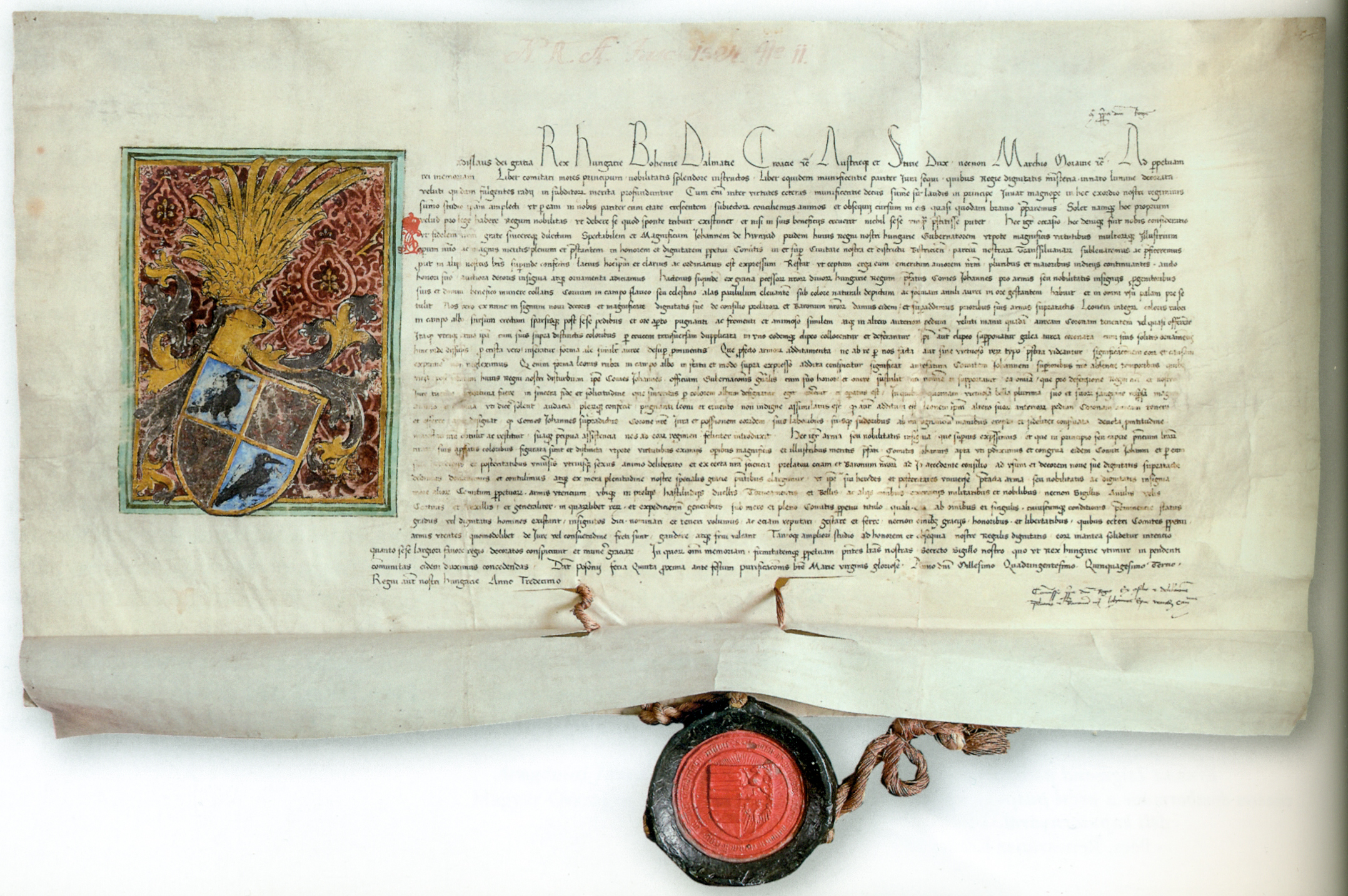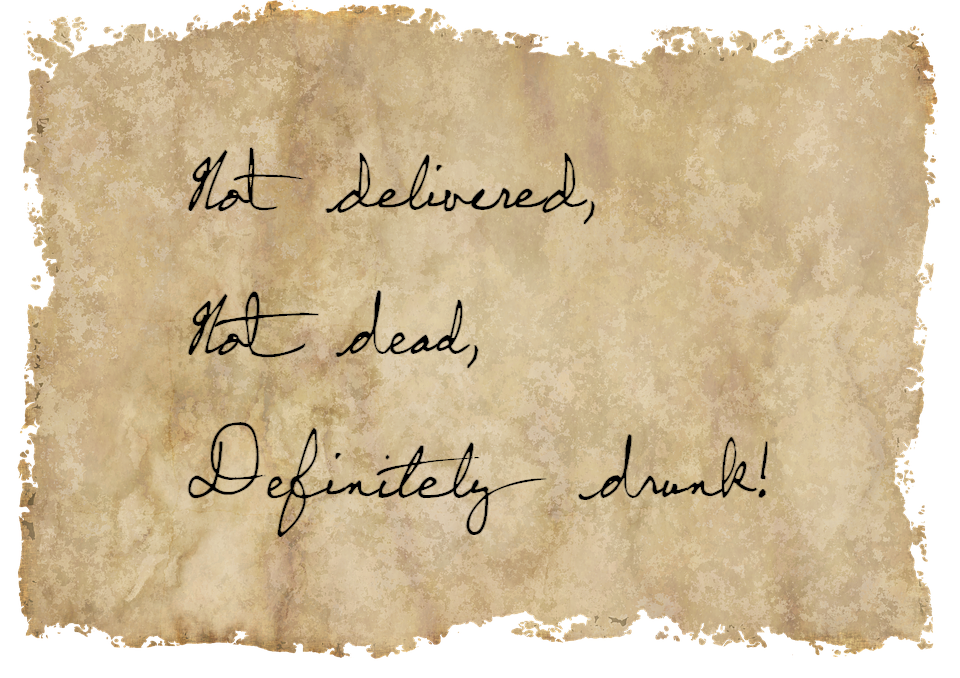Grand Ducal Postal Service of Rohsk
A comprehensive history of Rohsk's postal service, as recorded by Belonos Orlion, the last Head Postmaster
The incident at Aren Forest
Up to the beginning of 1156, Rohsk -like the other 3 Regions of Adhonaglamar- didn't have any organised courier service. Most of its inhabitants were illiterate and only the nobility occasionally sent out letters. They were most often delivered by errand boys of their household. Since most of those boys grew up inside their small villages, they more often than not got lost, taking ages to deliver their messages. For more important dispatches, a guardsman would be sent. They more familiar with the geography of Rohsk, but they encountered another danger on the road: inns and taverns. Well stocked with ale and entertainment, many a messenger lost track of time in such establishments. All that changed after the incident at Aren Forest. In the spring of 1156, as was his custom, the Grand Duke of Rohsk was preparing his yearly visit of the Market of Oswain. Oswain, located near the southern border of Rohsk, is several weeks' ride from Rohsk's capital Risha. To prepare his arrival, a handful of guardsmen were usually sent ahead. Such a party of guardsmen had been in Oswain a few days when one of them, a young scout named Finlay Epps, overheard two men talking about an ambush of the Grand Duke's caravan. With the help of the other guardsmen the two rogues were rounded up and interrogated. They confessed to being part of a band of mercenaries, hired to capture the Grand Duke. Their plan was to fall upon the caravan in Aren Forest, midway between Rohsk and Oswain. From there the Grand Duke would be taken across the border into Naeron. They knew the Grand Duke tended to travel with only a small escort of armed men, which would be easily outnumbered by the mercenaries. With not much time left before the Grand Duke was expected to pass through Aren, Epps was sent out in an effort to warn him. For 11 days and nights he rode tirelessly, only stopping to rest his horse. On the 12th day he reached the royal caravan. On the verge of collapse, he was brought before the Grand Duke and informed him of the plot. While the caravan took another road, avoiding Aren Forest, a nearby garrison rounded up the mercenaries. Realising the extraordinary speed with which Epps had made the journey, and being tired of his letters taking ages to arrive, the Grand Duke promoted the young scout to Head Courier of his household, a newly created position.Founding and expansion
After his appointment, Finlay Epps would be the sole official courier of the region for another 6 months. He mainly dealt with dispatches of the Grand Duke, occasionally taking messages for some of the Grand Duke's household. As other nobles in Rohsk started petitioning the Grand Duke to be allowed to call upon the services of his courier, he realised more couriers would be needed, as well as a larger organisational structure to organise and supervise their activities. At the end of 1156, the Grand Duke formally created the Grand Ducal Postal Service and housed them in a small wing of his estate in Risha. To oversee the organisation, the function of Head Postmaster was created. Out of gratitude for his services, it was offered to Epps, who turned it down. He had come to love the journeys throughout the region that his work as a courier brought him. Still young, he didn't relish the thought of being tied down in Risha. So the position went to Merton Pirn, a clerk who had served the Grand Duke's steward. In the years after its founding, the GDPS hired several dozen couriers. By 1160, the organisation had outgrew the wing at the Grand Duke's estate. So a new building, the Main Postal Hall, was erected in the East Quarter of Risha. Around that time several smaller postal halls were also housed inside the market halls of several major cities around Rohsk. Each was led by a Postmaster, who in turn answered to the Head Postmaster in Risha. In honour of the man responsible for the founding of their organisation, there would always be only one Head Courier in the entire organisation. This honorary title remained attributed to Epps, until his untimely death in 1164. As the common folk of Rohsk became more and more aware of the reputation of the GDPS and the advantages of a reliable messaging system, they gradually became frequent users of their services. Since many were still illiterate, they relied on local clerks to write down their messages and read out the replies. Never wasting an opportunity, the GDPS's second Head Postmaster started hiring clerks from 1162 onwards, to work under the direct supervision of the GDPS. The clerks were overseen by a Master of Clerks, who'd report to the Head Postmaster in Risha. These clerical services created a fresh stream of revenue for the GDPS, allowing the organisation to gather ever more wealth and influence."Delivered, or dead"
During the time preceding the Grand Ducal Postal Road initiative, the GDPS's motto often ended up being a sad reality.
Launch of the Grand Ducal Postal Road initiative
The Grand Ducal Postal Road initiative, also known as the GDPR initiative, was an attempt by the GDPS to address the frequent robberies and murders of couriers on the roads of Rohsk that the organisation suffered in the period between 1161 and 1163. The Inter-regional War of 1149 had left many former soldiers without patronage and income, which led to many of them forming small gangs that raided the countryside. GDPS's couriers were an easy target for these bandits. The letters they obtained during such raids were often of little value, and they would frequently find their way into the hands of local bards. Those took it upon themselves to turn them into entertaining stories for the people. The nobility, enraged by this theft of their personal communications and public disclosure thereof, pressured the Grand Duke into action. In 1163, after a particularly embarrassing revelation about a prominent nobleman's desire for his kitchen maid's fine 'duckies', the Grand Duke removed the acting Head Postmaster and appointed Ryle Fernash to lead the GDPS. A former high-ranking member of the Grand Ducal Guard, Fernash wasted little time. On his third day in office he hired fifty huntsman and former soldiers. They escorted the couriers on their journeys and actively hunted down any bandits along the main roads used by the GDPS. After 2 months the number of attacks had dwindled, as had the amount of new and entertaining stories for the people.The Disaster of Braedon
One of the largest postal halls outside of Risha was the one in Braedon. By 1173 it had 43 couriers in its service, as well as 17 clerks; nearly as much as the Main Postal Hall itself. Braedon was a tightly packed city, that flourished thanks to its iron ore and copper mines. Most of its buildings, especially around the old city centre, were mainly made out of wood. This proved to be its downfall. In late 1173, winter had set in early, with bone-dry icy winds blowing through the city for days on end. On the night of the 12th of November, fire broke out in one of the shops on the edge of the city square. Fed by the winds, the fire spread quickly. It ravaged through Braedon for two days and two nights, turning everything in its path to ashes. By the end of it, nearly three quarters of the city had been razed to the ground, including the postal hall. Its archives were lost, along with 21 couriers as well as 14 clerks. It was the largest loss of life for the GDPS in a decade. Rebuilding the city took years. By February 1174, the Head Postmaster ordered a new branch of the GDPS to be opened in Braedon. A small postal hall was built, serviced by only a handful of couriers and clerks. Their numbers would slowly increase in the following years, but the GDPS's activity in Braedon would always remain modest compared to its heyday.Infiltration by the Order of the Black Seal
For many more years the GDPS flourished and remained a respected organisation all around Rohsk. This did not go by unnoticed by the Order of the Black Seal, a criminal organisation. The Order had its roots in the unrest that eventually led to the Interregional War of 1149. Their main objective was to gather influence and power, but they operated from the shadows. They had a network of spies all over the 4 Regions of Adhonaglamar and had infiltrated many courts and noblemen's households. A campaign by the Monarch of Nearon to eradicate them had left them weakened in that region, but they remained strong and active elsewhere. In the summer of 1185, they started focusing their attention on the GDPS. They began by infiltrating the lower ranks of the workforce. Slowly they worked their way up through the hierarchy, until several Postmasters and Masters of Clerks were connected to the Order. By 1187 their main operations were managed through the GPDS, due to the advantage its network, speed and influence provided them. They moved their headquarters inside the Main Postal Hall in Risha, where they excavated the Black Room underneath the hall as their main base of operations. For several years they could work unchecked, spying and gathering wealth throughout Rohsk. It was their strength in Rohsk that eventually allowed them to slowly rebuild their activity in Naeron, after the Monarch's death in 1190.Purge and downfall of the GDPS
The beginning of the end for both the Order and the GPDS came in the fall of 1192. The Order had grown bold and was ever more openly meddling in the state affairs of all 4 Regions of Adhonaglamar. After several of their agents were caught and questioned, the Grand Duke of Rohsk ordered his State Marshal to start an investigation into their operations. The State Marshal brought together a small group of handpicked men -all shrewd bailiffs whom he trusted blindly- and set them to the task of unravelling the network of the Order. In secret, the bailiffs investigated every lead they had. They were highly effective at their task, so much so that the Order wasn't aware of them until it was too late. By February 1193 they had identified almost all the agents of the Order, including their entire network within the GDPS. In one perfectly coordinated move they raided all postal halls and arrested nearly three quarters of the GDPS's staff. Only a small handful of couriers, that had been on the road during the raids, managed to avoid arrest. Most of them fled across the border into the other Regions. The trials and executions were as swift as they were harsh. Crippled and bereft of most of its senior ranking officials, the GDPS was disbanded by the Grand Duke. The Black Room in Risha was laid bare and filled with rubble, their assets sold off.Author's note
And so the Grand Ducal Postal Service -of which I, Belonos Orlion, am the last Head Postmaster- has come to an end. While I await my execution, I felt obligated to safeguard the history of my beloved organisation for posterity. Although I know none will believe me, I am innocent. I never had any part in the Order, nor was I aware of what they turned our organisation into. Under the circumstances however, no proclamation of my innocence will save me from my fate. I am resigned to it. Delivered, or dead...Image credit: Medieval Shoe by Marieke Kuijjer | Black Seal by Chae Ho Lee | GDPR insignia & Handwritten note by me, Errandir
Grand Ducal Postal Road initiative insignia. Worn by the security forces hired to bring an end to the robberies and murders of couriers on the roads of Rohsk.
Note left pinned to the vest of courier Luke Savill. Savill was found late one night slumped against the facade of Braedon's postal hall. First presumed dead, it turned out he was drunk (a not uncommon occurrence). He had fallen off his horse on the road, after which a good Samaritan had picked him up and dropped him off at the hall - but not without showing his disdain for the courier's behaviour by leaving the note. Savill was fired the next morning by Braedon's Postmaster.
(The note reads: "Not delivered, Not dead, Definitely drunk!", a reference to the GDPS's motto.)
The Order of the Black Seal's insignia. Found on letters inside the Black Room by P. Gawyne, Head Bailiff of the State Marshal's investigation unit.
Remove these ads. Join the Worldbuilders Guild











I like how you went with a post service! Don't think I've seen any around on WA yet! Not to mention, you've got a very grounded history here— it really feels like something that could have happened in our own history.
Thanks a lot Garrett. I somehow decided on the topic, partly out of jest to myself; “how on Earth are you going to turn THAT into something interesting éh?”. I’m still developing my world, but I’m indeed a fan of medieval fantasy, where a lot could be like in our medieval age with just a few twists here and there.